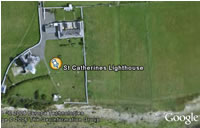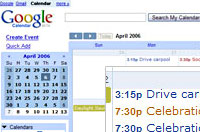 Google Earth/Maps
Google Earth/Maps
If you haven’t heard of AJAX (Asynchronous Javascript And Xml) you’re not a techie. It’s the buzzword of the moment and Google Maps uses it brilliantly (Google Mail is another example). It’s pretty old technology that uses the power of the client to locally render information delivered by the server. With Google Maps the browser loads a small Javascript application and sends data/requests back to the server which then delivers the next bit of data which the client then renders i.e. moving around a map.Google Earth is the next step in actually showing satellite data of the area you’re looking at (you can see cars parked in your street). Why would they want to offer these services? More advertising. Do a map search and you can also see information on local services (or restaurants, petrol stations, bars etc).They are both very powerful, easy-to-use apps. Google Calendar
Google’s latest AJAX application, Outlook calendaring but hosted centrally so it can be accessed from anywhere. Of course it’s more than just a calendar as it allows subscription to other calendar/events, sharing of calendaring information and even mobile synchronisation.Privacy
There’s been a lot of media interest in what information Google store about you as they could abuse it and the authorities could request it to see what you’ve been doing.  It’s uncertain how much information they do store, but it could be quite considerable. They actually might not know it’s you personally, but your computer. Google uses cookies which are used to track your personalisation settings, but they can store a lot more info, though Google are likely to just use the cookie as the identifier which enables them to quickly personalise things.Just looking at the information they could store when you do a search, it’s the search criteria itself, then which sites you clicked through to. But that can be combined with other info like what Google Map info you looked at, who you emailed through Google Mail and your previous search history. That may lead to a bleak picture if you’re committing illegal acts.The other side to it all is that the processing of all this information is extremely resource hungry and though Google are particularly good at correlating information, they might not bother. They will for some aspects, but most of the time it’s probably not worth it and they’ll keep succinct summarized information.If the authorities want to know what your doing, it’s actually much easier for them to go to your ISP and request the information from them (if they are running caching equipment which speeds up Web access for all users, they don’t just know what searches you’ve been doing, but every Website you’ve accessed and everything you’ve down or uploaded).The Future
It’s uncertain how much information they do store, but it could be quite considerable. They actually might not know it’s you personally, but your computer. Google uses cookies which are used to track your personalisation settings, but they can store a lot more info, though Google are likely to just use the cookie as the identifier which enables them to quickly personalise things.Just looking at the information they could store when you do a search, it’s the search criteria itself, then which sites you clicked through to. But that can be combined with other info like what Google Map info you looked at, who you emailed through Google Mail and your previous search history. That may lead to a bleak picture if you’re committing illegal acts.The other side to it all is that the processing of all this information is extremely resource hungry and though Google are particularly good at correlating information, they might not bother. They will for some aspects, but most of the time it’s probably not worth it and they’ll keep succinct summarized information.If the authorities want to know what your doing, it’s actually much easier for them to go to your ISP and request the information from them (if they are running caching equipment which speeds up Web access for all users, they don’t just know what searches you’ve been doing, but every Website you’ve accessed and everything you’ve down or uploaded).The Future
Google are encroaching into territory that used to be securely within the MS domain, desktop search and now IM. In the IM market they’re using open protocols which will gather traction from both the open source community and allow interesting applications to spawn from it.With things like Google Maps/Earth, searching has been moved from the electronic (or Internet) world to the real world. Google are already toying with mobile, but you can be sure that’s the space they’ll enter next.Imagine your smartphone or PDA with a local Google application installed. As you move around, it uses location based services and delivers relevant local information straight to the device. Looking for a restaurant? It’s got Google Talk too, so you can chat or really talk to the restaurant and book a table before you get there. Google are going to dominate the desktop and the mobile space and it’ll all happen in the background.Microsoft must be quaking as Google are their biggest threat.Let’s hope the Google Empire is benevolent and doesn’t become an evil behemoth.References
GMail Drive shell extension